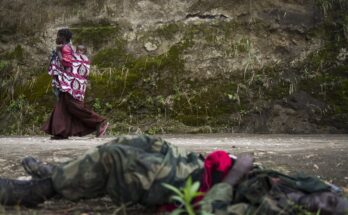 From left to right: Juma Ntakingora (executed on September 21, 2016); Alexandre Bemeriki (executed in October 2016); Benjamin Niyonzima (executed on December 16, 2016); Basabose Hakuzimana (executed on December 6, 2016); Elias Habyarimana (executed on March 25, 2017); Samuel Minani (executed on December 15, 2016); Jean de Dieu Habiyaremye (arrested in late November 2016 and executed two days later); Ernest Tuyishime (executed on August 5, 2016); Thaddée Uwintwali (executed on December 13, 2016); Emmanuel Ntamuhanga (executed in March 2017); Fulgence Rukundo (executed on December 6, 2016); Naftal Nteziriza (executed in late December 2016); Amulani Bazangirabate (executed in late December 2016); Jean Kanyesoko (executed on August 2, 2016); Claude Barayavuga (executed on April 27, 2017); Emmanuel Hanyurwabake (executed in late December 2016); Vedaste Renzaho (executed in late December 2016); Jeannine Mukeshimana (executed on December 16, 2016). © 2016 Private
From left to right: Juma Ntakingora (executed on September 21, 2016); Alexandre Bemeriki (executed in October 2016); Benjamin Niyonzima (executed on December 16, 2016); Basabose Hakuzimana (executed on December 6, 2016); Elias Habyarimana (executed on March 25, 2017); Samuel Minani (executed on December 15, 2016); Jean de Dieu Habiyaremye (arrested in late November 2016 and executed two days later); Ernest Tuyishime (executed on August 5, 2016); Thaddée Uwintwali (executed on December 13, 2016); Emmanuel Ntamuhanga (executed in March 2017); Fulgence Rukundo (executed on December 6, 2016); Naftal Nteziriza (executed in late December 2016); Amulani Bazangirabate (executed in late December 2016); Jean Kanyesoko (executed on August 2, 2016); Claude Barayavuga (executed on April 27, 2017); Emmanuel Hanyurwabake (executed in late December 2016); Vedaste Renzaho (executed in late December 2016); Jeannine Mukeshimana (executed on December 16, 2016). © 2016 Private
(Brussels) – A report published on October 13, 2017 by Rwanda’s National Commission for Human Rights (NCHR) attempting to discredit Human Rights Watch documentation of extrajudicial killings and enforced disappearances is full of falsehoods, compounding the injustice and abuse suffered by the victims’ families, Human Rights Watch said today. Human Rights Watch has found that Rwandan government officials threatened and coerced victims’ family members to present false information about what happened to their loved ones. Human Rights Watch is deeply concerned about the family members’ safety.
The NCHR report purported to “know the truth” about a Human Rights Watch report released in July, that details how military, police, and auxiliary security units, sometimes with the assistance of local civilian authorities, apprehended suspected petty offenders and summarily executed them. The allegations in the NCHR report and its corresponding news conference were largely fabricated and misrepresented Human Rights Watch’s work.
“The allegations by the National Commission for Human Rights show that Rwandan authorities are unwilling to tolerate criticism or make meaningful attempts to improve the country’s human rights record,” said Ida Sawyer, Central Africa director at Human Rights Watch. “Instead of discussing the findings with Human Rights Watch – before publication – as requested and opening serious investigations, Rwandan officials presented false accounts and threatened those who dared to speak out about the killings.”
Human Rights Watch found that local officials or security forces detained family members of victims who refused to fabricate stories about what happened to their loved ones. “The local authorities asked me if I was ready to tell officials who would come to our village that [the victim] had died from illness at the hospital, but I refused,” a family member of one of the victims told Human Rights Watch. “I saw how [the victim] was killed, and I could not change the truth. A few days later, I was arrested.” He said he was released after several days.
A France 24 investigation, aired on October 31, found numerous discrepancies in the NCHR report and corroborated the circumstances surrounding four of the summary executions documented by Human Rights Watch.
Since the NCHR report was issued, Human Rights Watch has analyzed the report as well as the statements made during the October 13 news conference and the commission’s presentation to parliament on October 19. Human Rights Watch has also carried out further investigations into some of the killings. Some of the witnesses Human Rights Watch spoke to were shocked to learn what had been alleged in the NCHR report.
A case in point was the extrajudicial killing of Alphonse Majyambere. The NCHR produced a different person at its news conference – with the same name, but from a different sector and almost 30 years older than the person who was killed.
For the case of Elias Habyarimana, killed by security forces in March, the NCHR presented a woman named Pelagie Nikuze who said Habyarimana is her husband and that he is living in Belgium. Human Rights Watch found that the man who is said to be in Belgium is a different person. The man killed in March was a fisherman who never had a passport.

Fulgence Rukundo was executed on December 6, 2016.EXPAND
Fulgence Rukundo was executed on December 6, 2016. © 2016 Private
The NCHR acknowledged that Fulgence Rukundo was killed, contending it was for illegally crossing the border with the Democratic Republic of Congo. Yet several villagers confirmed to Human Rights Watch in late October that they and dozens of other people from their village had personally witnessed soldiers executing Rukondo for allegedly stealing and killing a cow on December 6, 2016, in Kiraga cell, several kilometers from the border.
“The death of [Rukundo] is a known story on the hill [where we live],” a witness told Human Rights Watch on October 24. “The human rights commission was too afraid to come here. If they dared approach me now, I would spit in their faces, ready to suffer the consequences.”
The cases are included in the 40-page July report by Human Rights Watch, “‘All Thieves Must Be Killed’: Extrajudicial Executions in Western Rwanda,” which documents the extrajudicial executions of at least 37 suspected petty offenders and the enforced disappearances of four others between April 2016 and April 2017. Human Rights Watch has since documented at least one additional killing by police of a suspected thief in the same period. Family members were threatened when they tried to recover the bodies of their loved ones, and authorities spoke about the executions in public community meetings, using the killings as a warning to other would-be thieves. Since the Human Rights Watch report was released in July, the killings appear to have stopped.
Source: https://www.hrw.org/news/2017/11/01/rwanda-cover-negates-killings


